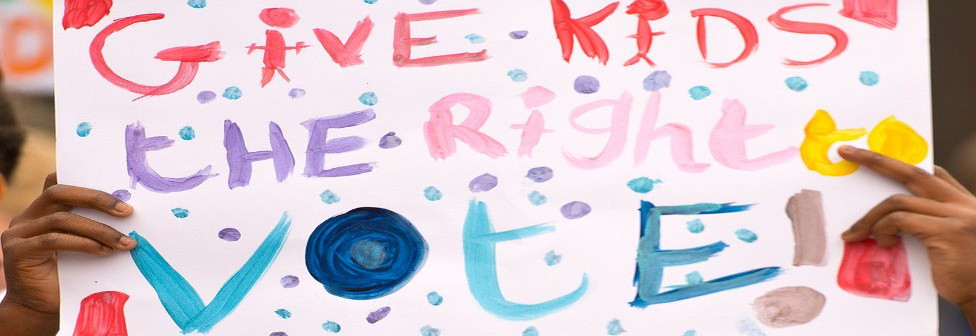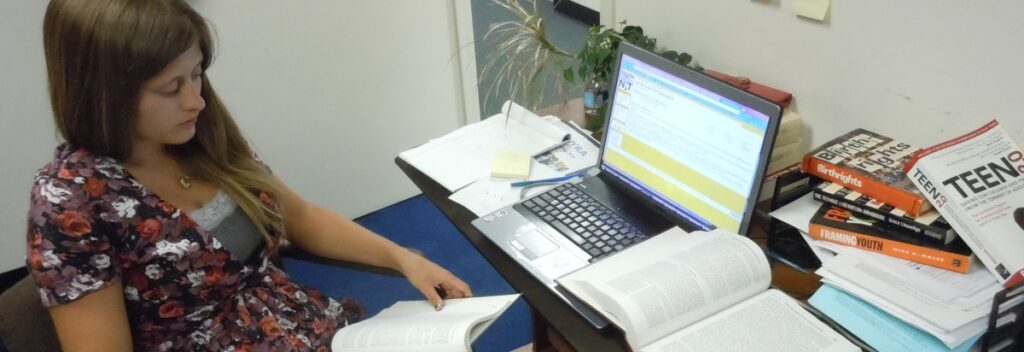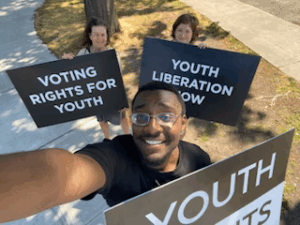Advocating for the right to vote isn’t easy, but we’ve put together a list of talking points that you can use whether you are talking to your friends and family or writing a speech to give at your city’s council meeting. We’ve also included academic articles and persuasive essays for those who want a more in-depth analysis. And be sure to check out our Top Ten Reasons to Lower the Voting Age as well!
Young people are directly affected by political decisions
- The 26th Amendment to the US Constitution, which lowered the voting age to 18, was passed because of the clear double standard of making 18-year-olds fight for their country when they didn’t have a political voice. The idea that anyone directly affected by political decisions should have a right to voice their opinions on such decisions should not be limited to only military conscription.
- Young people are most directly impacted by education policy. Students have a better understanding of what reforms are needed, but can’t even vote in school board elections.
- Young people will live with the effects of climate change for longer and are more likely to live in poverty than adults, but have no voice in determining public policy decisions.
- Young people pay taxes (including $730 million in income tax in 2011) and have no say on how that money is spent.
- Many people 16 and younger are tried as adults and are placed in adult jails. If youth can be punished like adults, they should be given the rights of adults.
Young people demonstrate responsibility, maturity, and knowledge comparable to other voters
- Over one million Americans under the age of 18 have jobs, often while attending school at the same time.
- Sixteen- and seventeen-year-olds are allowed to drive in all 50 states.
- A study of 16- and 17-year-old Americans showed that they are “generally indistinguishable in their capacities to function as citizens and to vote responsibly from the youngest adults (18-year-olds) who are entitled to vote…[and] that to deny 16- and 17-year-olds the right to vote is arbitrary.”
- Young people are often taking classes in history, government, law, and/or economics which can help make them more informed voters.
- Studies show 16-year-olds show adequate political knowledge to make informed decisions. In fact, 16-year-old Americans score higher in areas related to civic knowledge than those in their early twenties.
- The federal Voting Rights Act of 1965 states that:
any person who has not been adjudged an incompetent and who has completed the sixth grade in a public school in, or a private school accredited by, any State or territory, the District of Columbia, or the Commonwealth of Puerto Rico where instruction is carried on predominantly in the English language, possesses sufficient literacy, comprehension, and intelligence to vote in any election.
- Students who took participated the “We the People ” program, which is civics curriculum created by the Center for Civic Education, scored better than adults 18-80 in knowledge of government and politics:
| Question | WTP Students Answering Correctly | Adults (18-80) Answering Correctly |
|---|---|---|
| Could name the vice-president | 96% | 74% |
| Understood the meaning of “Judicial Review” | 96% | 66% |
| Knew Two-Thirds Veto Override Requirement | 87% | 34% |
| Knew which political party controlled the House of Representatives | 68% | 68% |
| Could explain political party ideology | 87% | 57% |
- Adults who are ignorant about political issues are not kept from voting. A 2014 study showed only 38% of adult respondents knew which party controlled the House of Representatives and the Senate and only 36% could name all three branches of government. In another poll, only 39% of adult respondents could accurately identify the area that the government spends the most money. If adults lack even basic knowledge of who represents them and how the government works, how can youth be classified as not knowledgeable enough to vote?
- Adults also tend to overestimate their knowledge of civics, which may lead to increased hesitation to expand their political knowledge.
Young people will turnout to vote
- Even when denied the right to vote, nearly half of Generation Z believes that voting is important even though they cannot vote.
- People under 18 often have a higher voter turnout rate than older groups, such as:
- Chicago Primary (2014): 17-year-olds had a higher turnout rate than any other age group from 18-48.
- Scotland National Referendum (2014): 16-17 (75%), 18-24 (54%), 25-34 (72%)
- Takoma Park, MD Municipal Election (2013): 16-17 (17%), other voters (8.5%)
- Vienna, Austria (2010): 16-17 (64.2%), 18–20 (56.3%)
- Norway (2011): 16-17 (58%), 18–21 (46%)
- Baltimore Mayoral Primary (2003): 16-17 (35%), all voters (36%)
Youth voting also increases voter turnout among adults
- According to research done by CIRCLE (The Center For Information & Research On Civic Learning & Engagement), involving young people in election-related learning, activities and discussion can have an impact on the young person’s household, increasing the likelihood that others in the household will vote.
- Studies conducted by the Kids Voting, a program that conducts civic education and mock elections in K-12, have shown that adult voters, including, but not limited to the parents of participating students, are more likely to turnout to elections has a result of the mock elections.
- Because of the habitual nature of voting, 16 is a better age to introduce voting. At 18, many young people moving from one community to another. (This is especially true for college students who may register at home, but be living in another state come Election Day.) At 16, most people’s living arrangements are pretty stable as they are less likely to leave their community in the middle of high school. If citizens begin voting earlier, and get into the habit of doing so earlier, they are more likely to stick with it through life.
States are allowed to set their voting age below 18
- Some people mistakenly believe that the 26th Amendment to the United States Constitution set the voting age at 18. However, it clearly states: “The right of citizens of the United States, who are eighteen years of age or older, to vote shall not be denied or abridged by the United States or by any State on account of age.” This only prohibits states and municipalities from setting a voting age above 18, it does not prevent states from lowering it.
Organizations and people that support lowering the voting age
The Center for Information and Research on Civic Learning & Engagement (CIRCLE)
A majority of House Democrats and Michael Burgess (R-TX)!
High School Democrats of America
San Francisco Democratic Party
Fairfax County Democratic Committee
NAACP CO-WY-MT State Conference
Colorado Education Association
March For Our Lives Massachusetts
League of Women Voters Massachusetts
Youth Climate Strike Coalition
San Francisco Youth Commission (Richmond, CA)
Richmond Youth Council (Richmond, CA)
Northampton Youth Commission (Northampton, MA)
Our CAPS Community Alliance for Peaceful Streets (Washington, DC)
United Teen Equality Center (Lowell, MA)
Kate Brown, Oregon Governor
David Zuckerman, Vermont Lieutenant Governor
Keith Ellison, Minnesota Attorney General and former U.S. Representative
2020 Presidential Candidates Tulsi Gabbard, Tim Ryan, Eric Swalwell, Seth Moulton, Andrew Yang, Marianne Williamson, and Vermin Supreme
56 Massachusetts Senators and Delegates
Ed Ableser, Arizona State Representative
Phyllis Kahn, former Minnesota State Representative
Javier Martínez, New Mexico State Representative
Ralph Nader, former Green Party Presidential Candidate
Nancy Pelosi, U.S. House Minority Leader
Jill Stein, Green Party Presidential Candidate
Evan Low, California State Assembly Member
Carolyn Maloney, U.S. Representative from New York
Luis Gutiérrez, U.S. Representative from Illinois
Richard Branson, Investor and philanthropist
Francis Schrag, education policy professor
William Frey, Brookings Institute demographer and population studies professor
Jason Kander, former Missouri Secretary of State and head of Let America Vote
John Wall, ethicist
Shaun King, journalist
Michael Moore, documentary filmmaker
Kojo Nnambi, NPR host
George Soros, Investor and philanthropist
Laurence Steinberg, journalist and psychology professor
Laurence Tribe, Harvard law professor
Ilya Somin, George Mason University law professor
Paul Peterson, government and education reform professor
Daniel Hart and Robert Atkins, childhood studies professors
Paul Demeny, demography professor
The editorial boards of The Washington Post and The Boston Globe
Papers and Reports
Argumentative essays
- Age of Electoral Majority
Law professor Vivian Hamilton argues that the arguments justifying exclusion of “mid-adolescents” from voting based on a lack of electoral competence is not valid and suggests that the presumption of inclusion obliges states to adjust the age of electoral majority downward. - Children’s Most Essential Right
This article focuses on the legal argument for lowering the voting age and the use of social science research to support that argument.
By Ben O’Meara MSW/JD/LLM
University of Iowa School of Law 1999
Loyola University Chicago School of Law 2001 - Children and Political Representation: The Challenge of the Gift
Professor John Wall asks what it might mean for the third of humanity under eighteen years of age to gain genuine representation in political life. - Children’s Political Representation: The Right to Make a Difference
John Wall and Anandini Dar explore what it might mean for children to enjoy genuine political representation. - Children’s Political Rights
Children’s rights activist Bob Franklin examines and takes a critical view of four common objections to including children in political life. - Democratising Democracy -The Road from Women’s to Children’s Suffrage
Philosophy professor John Wall This article advances this discussion by comparing children’s suffrage debates today to those surrounding the global women’s suffrage movements of the past century and a half. It argues that minor enfranchisement requires postmodern rather than modern conceptions of democratic inclusion and revised understandings of voting rights as such. - Democratic Inclusion, Cognitive Development, and the Age of Electoral Majority
Law professor Vivian Hamilton argues that “presumptive electoral inclusion” places the burden on the state to justify excluding young people from the electoral process. - In Defense of Lowering the Voting Age
Law Professor Joshua Douglas explores various reasons that defend lowering the voting age. - Proposal to Lower the Voting Age
This well-researched proposal makes the case for why Washington, DC should lower its voting age. - The Right to Vote
Youth rights theorist John Holt argues why people of all ages should be more involved in their government and vote. Taken from the youth rights classic Escape from Childhood.
Research studies
- American Sixteen- and Seventeen-Year-Olds Are Ready to Vote
Professors Daniel Hart and Robert Atkins argue that 16- and 17-year-olds should be able to vote in both state and federal elections by identifying the core components of citizenship and illustrating that 16- and 17-year-olds possess them. - Are People More Inclined to Vote at 16 than at 18? Evidence for the First-Time Voting Boost Among 16- to 25-Year-Olds in Austria
Political scientists Eva Zeglovits and Julian Aichholzer examine voter turnout of people aged 16 to 17 in Austria and conclude lowering voting age contributes to higher voter turnout rates. - Leaving the Nest and the Social Act of Voting: Turnout among First-Time Voters
Researchers Yosef Bhatti and Kasper M. Hansen show that introducing voting at a younger age, when young people are more likely to live at home, should increase voter turnout. - Lowering The Voting Age For Local Elections In Takoma Park and Hyattsville, MD: A Case Study
A case study from Generation Citizen analyzes the positive effects of lowering the voting age in two Maryland towns. - Voting at 16: Turnout and the quality of vote choice
Studying data from Austria election, researchers Markus Wagner, David Johann, and Sylvia Kritzinger show that the quality votes cast by people under 18 is similar to those of older voters. - Why Did They Vote? Voting at 16 and the Mobilizations of Young Voters in the 2011 Norwegian Local Election
Researchers Guro Ødegård, Johannes Bergh, and Jo Saglie discuss the reasons for the high turnout rate of 16- to 18-year-olds in the 2011 Norwegian election.
Quotes
No right is more precious in a free country than that of having a choice in the election of those who make the laws under which…we must live. Other rights, even the most basic, are illusory if the right to vote is undermined. – Wesberry v. Saunders (1964)
If 16-year-olds are old enough to drink the water polluted by the industries that you regulate, if 16-year-olds are old enough to breathe the air ruined by garbage burners that government built, if 16-year-olds are old enough to walk on the streets made unsafe by terrible drugs and crime policies, if 16-year-olds are old enough to live in poverty in the richest country in the world, if 16-year-olds are old enough to get sick in a country with the worst public health-care programs in the world, and if 16-year-olds are old enough to attend school districts that you underfund, then 16-year-olds are old enough to play a part in making them better. – Rebecca Tilsen








